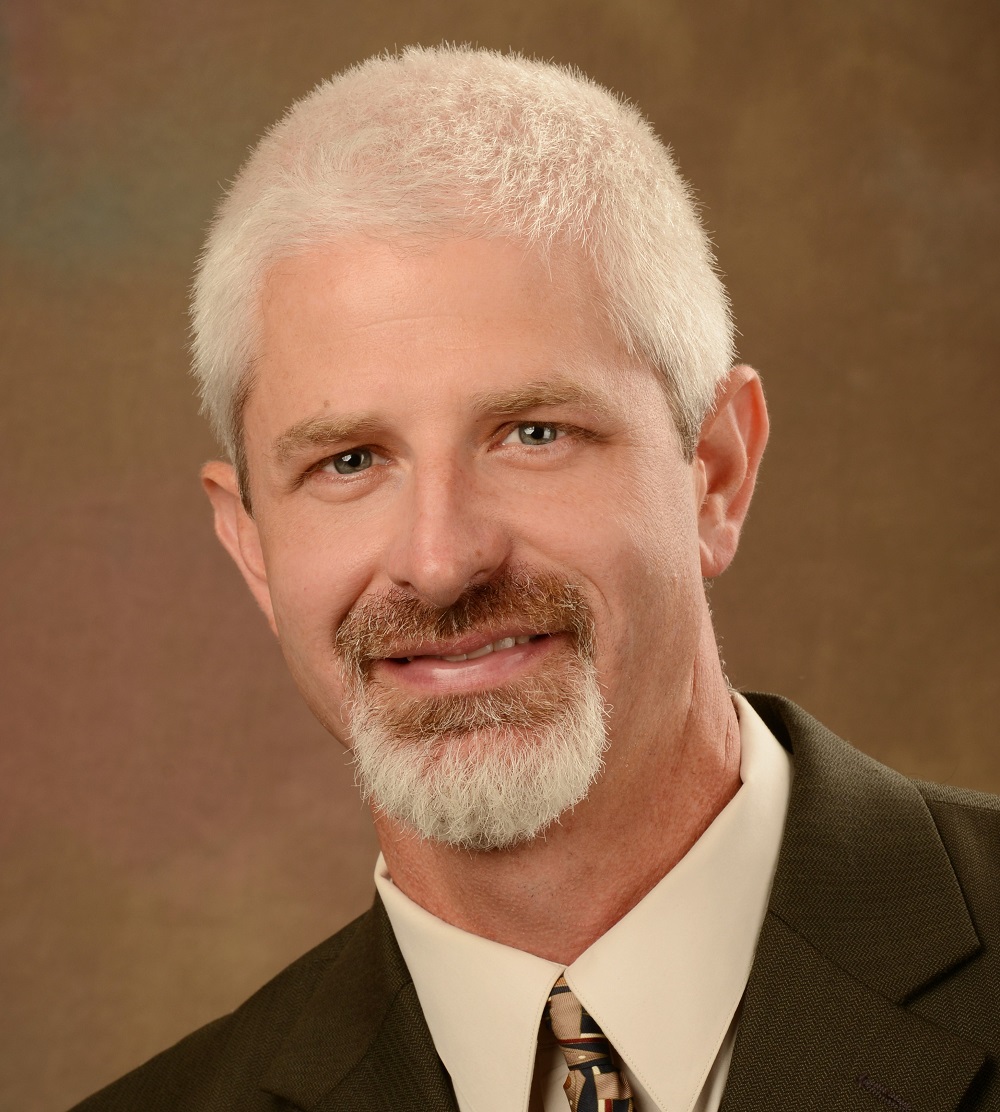Robbins, Inc. Hires Dave Fulton As President
Jay Stoehr remains CEO of family-owned flooring company,
adds proven leader as part of succession plan.
 CINCINNATI, OH November 3, 2016 — Robbins, Inc., an international leader in sports flooring systems, has hired Dave Fulton as President to oversee all manufacturing, sales and service functions.
CINCINNATI, OH November 3, 2016 — Robbins, Inc., an international leader in sports flooring systems, has hired Dave Fulton as President to oversee all manufacturing, sales and service functions.
James (Jay) Stoehr III, the fourth generation of his family to lead Robbins, had been serving as President, CEO, and Chairman of the Board. He will retain his other leadership roles, and Fulton will report to him.
Fulton had served as Manufacturing Leader for Cincinnati-based Shepherd Color Company, a multi-generation family-owned color pigment business, since 2014. He previously was President of Dayton, Ohio-based Hohman Plating & Manufacturing from 2008 to 2014.
Fulton received two degrees from the University of Cincinnati: a Bachelor’s of Science in chemical engineering and an MBA in finance. He is a resident of Lawrenceburg, Ind.
“Dave is a transformational business leader with a wealth of experience growing and leading family-owned manufacturing businesses,” Stoehr said. “He understands the manufacturing process as well as its role in driving business growth. I’m counting on him to bring his formidable skills to bear to focus on strategic planning, operational excellence, organizational development and financial results.”
Robbins is based in Cincinnati’s East End neighborhood with sales offices across the U.S. and manufacturing plants in Michigan and Wisconsin. The privately held company’s main business unit is Robbins Sports Surfaces, the premier supplier of high-performance maple and synthetic sports flooring systems to professional and college athletic programs as well as fitness, religious and performing arts.
Athletes in more than 65 nations on six continents compete and practice on the company’s sports surfaces. More NBA teams use Robbins flooring than all other competitors combined, with 90% of teams owning the company’s competition and/or training facility floors — including the NBA champion Cleveland Cavaliers, who have played home games on a Robbins floor since 1974.
Stoehr credits a 20-year relationship with the Goering Center for Family & Private Business, based at the University of Cincinnati, with helping him plan for succession in a family business and prioritize business success ahead of personal interests or ambitions. Working with Robbins’ Board of Advisors, Stoehr developed a succession plan that led to the decision to hire a President to assume day-to-day operational responsibility.
“We’ve made this exciting change because Robbins is built on strong values that focus on doing the right thing for employees, customers and vendors while strengthening the company legacy,” Stoehr said. “I’m confident that Dave’s addition to our leadership team will do just that.”
Fulton began work as Robbins President on October 31. Continue Reading →
#IAVMweekly5 Recap

Over the past 10 weeks, we’ve been spotlighting some of our favorite Instagram photos from members and venues worldwide in our #iavmweekly5 series. This week we are featuring a recap of all 50 photos that have been selected. It has been a pleasure selecting these photos week after week, and we’ve gotten a really neat look at some really neat venues through impeccably crafted photographs. Thank you all for continuing to share your gorgeous venues and the people within them to the world.
If you haven’t followed us on Instagram yet, now is a good time. By following us, you’ll be entered into our monthly drawing where you can win prizes such as conference registrations, full-page ads in FM magazine, and textbooks. The next drawing will be November 7.
So behold, our #iavmweekly5 recap!
Spectra by Comcast Spectacor Names Industry Veteran John Wentzell as President, Venue Management and Food Services & Hospitality
 Spectra by Comcast Spectacor, the expert in hosting and entertainment, Monday (October 31) named industry veteran John Wentzell as President of its Venue Management and Food Services & Hospitality division, according to Dave Scott, the Comcast Spectacor President and CEO. Wentzell, a former Comcast Spectacor executive, will rejoin the company beginning Monday, November 7.
Spectra by Comcast Spectacor, the expert in hosting and entertainment, Monday (October 31) named industry veteran John Wentzell as President of its Venue Management and Food Services & Hospitality division, according to Dave Scott, the Comcast Spectacor President and CEO. Wentzell, a former Comcast Spectacor executive, will rejoin the company beginning Monday, November 7.
“John is an accomplished executive in the sports and entertainment industry, recognized for driving profitable growth, operational excellence, and financial performance,” said Scott in making the announcement. “His strong entrepreneurial passion and keen insight into the needs of the customer will be invaluable in helping Spectra to continue anticipating and exceeding our customers’ expectations.”
Wentzell returns to Comcast Spectacor after nearly 20 years with Delaware North Companies, where he most recently served as President, Delaware North Sportservice and Delaware North – United Kingdom, where he was responsible for growth strategies, financial and capital planning, acquisitions, talent development, product and service innovation, large client relationship management and business development at both companies. During his time with Delaware North, he also spent six years as President, Delaware North, Boston, where he oversaw the TD Garden, the adjacent commercial development, and the business side of the Boston Bruins.
At Comcast Spectacor, Wentzell was Chief Operating Officer of the Philadelphia Phantoms, the American Hockey League affiliate of the Philadelphia Flyers from 1996-2009. The Phantoms were sold in 2009 and relocated to Adirondack. The team remains the AHL affiliate of the Flyers and now plays its home games at the PPL Center in Allentown, PA, a Spectra property. He also was a General Manager with regional responsibilities at Spectacor Management Group, when it was partially owned by a Comcast Spectacor affiliate.
“John’s experience at Delaware North Companies makes him an invaluable asset as we further grow our Spectra business,” added Scott. “He knows our industry and understands our customers, and will hit the ground running.”
Spectra provides Venue Management, Food Services & Hospitality, or Ticketing & Fan Engagement to over 300 clients at more than 400 global properties.
As President of Spectra’s Venue Management and Food Services & Hospitality division, Wentzell will focus on developing more and better ways to serve Spectra customers through new product development, improved operational performance and enhanced client satisfaction.
Wentzell will be responsible for all aspects of Spectra’s Venue Management and Food Services & Hospitality division, including business development, finance, marketing, corporate partnerships, and operations. Spectra’s four Division Senior Vice Presidents (DSVP) Mike Scanlon, Northeast Division; Doug Drewes, Southeast Division; Shura Garnett, Central Division; and Charlie Neary, West Division, will report to Wentzell.
“John has an excellent reputation in our industry and has instant credibility with our clients and employees. We are very excited to have him join our team,” said Ken Young, Founder of Spectra Food Services and Hospitality. “We will benefit greatly from his experiences.”
Spectra’s bundled approach, where more than one of its divisions — Venue Management, Food Services & Hospitality or Ticketing & Fan Engagement — is at work for the same client, is generating exceptional results. Seven facilities featuring Spectra’s bundled strategy set best fiscal year records this past year.
This unique advantage is distinct to Spectra, as no other firm in the industry can provide a service bundle that is as comprehensive. Spectra clients enjoy a number of synergies, including reduced overhead, the ability to combine certain overhead positions, driving higher food and beverage profit margins, coordination in securing high-draw events, and cohesive corporate support and client communications, among other advantages.
Wentzell received a Master of Science, Sports Management, from the University of Massachusetts (Amherst) and Bachelor of Arts, Physical Education/Sports Management from Otterbein University.
About Spectra
Spectra by Comcast Spectacor is the expert in hosting and entertainment, partnering with over 300 clients at 400 global properties to create memorable experiences for millions of visitors every year. Spectra’s expertise is embodied within three divisions: Venue Management, Food Services & Hospitality, and Ticketing & Fan Engagement. Learn more at SpectraExperiences.com.
About Comcast Spectacor
Comcast Spectacor is part of Comcast Corporation, a global media and technology company that operates Comcast Cable and NBCUniversal. Headquartered in Philadelphia, Pa., Comcast Spectacor’s three core businesses are the National Hockey League’s Philadelphia Flyers, the Wells Fargo Center venue, and Spectra, the expert in hosting and entertainment through its Venue Management, Food Services & Hospitality, and Ticketing & Fan Engagement divisions. Visit us at ComcastSpectacor.com for more information.
Media Contact:
Ike Richman
Vice President, Public Relations
Comcast Spectacor
Tel: 215-389-9552
Hawai’i Convention Center Expects First Profit Ever

CRAIG T. KOJIMA / CKOJIMA@STARADVERTISER.COMThe Hawai‘i Convention Center is on pace to end the year with its first profit since it was built in 1998. This statue, “The Water Giver,” by Maui artist Shige Yamada, is on the Kapiolani Boulevard side of the center.
Article originally published in Honolulu Star Advertiser. By Allison Schaefers
The Hawai‘i Convention Center is on track to achieve its first profit since opening in 1998.
Teri Orton, the convention center general manager, said the facility had $1.5 million in net income through September. Even with fourth-quarter seasonal lulls, Orton said the center should be able to hang on to a $14,000 profit.
“It’s quite a feat. It’s like turning the Titanic right side up,” Orton said.
In January state lawmakers pressured AEG and the Hawaii Tourism Authority, which oversees the center, to cut losses and retire debt. Some lawmakers were surprised to learn how high the debt was.
The building cost $350 million to construct. HTA has made $455 million in principal and interest payments but still owes $297 million. HTA is paying 6 percent interest and has restructured the debt several times, tacking on extra years and interest. The debt won’t be paid off until 2027 under the current repayment schedule.
Marc Togashi, HTA’s vice president for finance, told lawmakers earlier this year the 2016 center budget included a $2.6 million operating loss. If the facility, instead, achieves a profit, it would put it ahead of a 2018 break-even goal.
HTA and AEG have been working to increase group business. Through September the state welcomed 384,121 group arrivals — a 3 percent year-over-year improvement. Now, AEG’s challenge is to increase “citywides,” the industry term for large events that spread business across multiple venues.
“While AEG deserves credit for what they are doing, I don’t want anyone to think operating profits are the goal. Hotel room nights are what generate visitor spending and put people to work. They have got to raise the room-night bar over time,” said Keith Vieira, principal of KV & Associates, Hospitality Consulting, who previously served on the HTA board.
Orton said the convention center is within 46 percent of its year-end goal to book 225,000 future hotel room nights — the number of nights hotel rooms are booked by guests attending convention center events. She said center staff must convert another 121,440 tentative bookings into actuals. Since most signings for future events take place at year’s end, Orton said the center will offer bonuses for 2016 contracts.
“Our main purpose and goal is to bring business to our hotel partners,” she said. “Achieving our room night goal will put us 12 percent ahead of last year. We’ll keep increasing our goals.”
During the first nine months, the center hosted 142 events; it is expected to finish the year with 184 events, up from 181 events last year. The center’s food and beverage revenue hit a new high of $9.9 million through September. It’s expected to reach nearly $11.3 million by year’s end, a $2.6 million increase over its $8.6 million goal.
Through September, center occupancy was 32 percent. On average, occupancy at successful centers falls between 40 and 60 percent, Orton said.
Orton said the center hopes to draw from AEG’s expertise in entertainment and sports, she said.
She ordered $1 million in new flooring so the center can convert its 204,000-square-foot exhibition hall into courts as needed to host amateur and pro sporting events from indoor soccer to volleyball, basketball and badminton.
“We’ve already got some really good leads, including one volleyball and two basketball tournaments, and some definite business for 2017,” Orton said.
Since most large groups are booked five to 10 years out, Orton said it will take time to see the full impact of new strategies.
Jerry Gibson, area vice president for Hilton Hawaii, said the convention center’s achievements are critical to visitor industry success.
“We build our base of business off of these conventions, which help us plan for next year’s budget season,” Gibson said.
Group travelers are coveted because they tend to spend more than leisure travelers, he said. A high percentage of group travelers bring friends and family with them for pre- and post-trips and return to Hawaii for vacations, Gibson said.
“They fall in love with Hawaii and come back,” he said.
IAVM Welcomes R.V. Baugus and Meredith Merritt
 R.V. Baugus
R.V. Baugus
The International Association of Venue Managers has named R.V. Baugus as the organization’s new Senior Editor. R.V. Baugus is a communications veteran with almost 20 years’ experience covering the public assembly venue industry. R.V. is no stranger to IAVM. He worked at the association from 2000-2013 as editor of Facility Manager magazine. He started his own freelance company and has written for a number of association publications, Venues Today magazine and serves as a contributing editor to Dave Campbell’s Texas Basketball magazine.
During his previous service at IAVM, R.V. was the recipient of 10 of his 11 earned Quill Awards in various writing categories given by the Dallas chapter of the International Association of Business Communicators. Facility Manager also received two magazine redesign awards and enjoyed its highest ad sales revenue during his tenure.
“I have always considered IAVM my home and my family,” R.V. said. “I am a major consumer of the various types of events that take place at our member venues and have a passion as a fan and a great understanding as a professional for the work that IAVM members do across the world at their various venues.”
Prior to coming to IAVM in 2000, R.V. was a communications associate at Young Presidents’ Organization and served as news editor of Promotional Products Business magazine with Promotional Products Association International, where he earned his other Quill Award. R.V. has also been responsible for publications with the Association of Tennis Professionals and World Championship Tennis.
R.V. is a Dallas native and a graduate of the University of Texas at Arlington with a Bachelor of Arts in Communication (Journalism). He was proudly married for almost 25 years to Tanya Bailey Baugus before her sudden passing last year.
R.V. resides in Grand Prairie, Texas. In addition to being involved as a deacon at Oak View Baptist Church, R.V. serves as the public address announcer at Joy & Ralph Ellis Stadium in Irving, where he calls football games for the city’s three high schools. He also serves on the board of directors for Irving Schools Foundation.
Meredith Merritt
The International Association of Venue Managers has named Meredith Merritt as the organization’s new Director of Development. Meredith will be joining the staff November 3, 2016. She will work with IAVM President/CEO Brad Mayne, CFE and Chair of the IAVM Foundation, Bob Hunter, CFE as well as the Board of Trustees to implement a variety of fundraising strategies and initiatives while increasing awareness of the IAVM Foundation.
Meredith brings over 10 years of experience in the industry, most recently as Senior Events and Sales Manager for the AT&T Performing Arts Center in Dallas, TX where she was responsible for cultivating and maintaining relationships with clients which included donors, sponsors, media partners, community partners, annual clients and new clients. Meredith has been a member of IAVM for 5 years and has volunteered on several IAVM committees. Merritt graduated from Clemson University with a BA in Communications Studies and is a two-year graduate of IAVM’s Venue Management School
Do you want to receive a Front Row News weekly digest?
Categories
- Allied (856)
- Architecture (147)
- Arenas (744)
- Career (890)
- Convention Centers (889)
- Education (608)
- Events (1,528)
- Food & Beverage (193)
- Foundation (113)
- Guest Experience (1,482)
- Industry News (2,253)
- Leadership (1,872)
- Marketing (150)
- Membership (1,985)
- Music (212)
- Performing Arts Centers (453)
- Professional Development (398)
- Research (127)
- Safety & Security (425)
- Sports (763)
- Stadiums (607)
- Student (159)
- Technology (515)
- Ticketing (92)
- Touring (82)
- Trends (357)
- Uncategorized (771)
- Universities (216)
- Video (25)
- Young Professional (198)
Twitter Feed
- Twitter feed loading
Recent Posts
- GEODIS Park Selects Allied Universal As Its Preferred Event Services Provider
- Venuworks Appoints Marc Solis as Executive Director of the Fresno Convention and Entertainment Center
- Los Angeles Convention Center Diverts 8,000 Pounds of Wood Waste to Local Foundation Supporting Fire Victims
- Fort Worth Unveils Plans for Phase 2 of Convention Center Transformation
- San Diego Convention Center CEO Announces Retirement After a Decade of Leadership
Categories
- Allied
- Architecture
- Arenas
- Career
- Convention Centers
- Education
- Events
- Food & Beverage
- Foundation
- Guest Experience
- Industry News
- Leadership
- Marketing
- Membership
- Music
- Performing Arts Centers
- Professional Development
- Research
- Safety & Security
- Sports
- Stadiums
- Student
- Technology
- Ticketing
- Touring
- Trends
- Uncategorized
- Universities
- Video
- Young Professional
Archives
- February 2026
- January 2026
- December 2025
- November 2025
- October 2025
- September 2025
- August 2025
- July 2025
- June 2025
- May 2025
- April 2025
- March 2025
- February 2025
- January 2025
- December 2024
- November 2024
- October 2024
- September 2024
- August 2024
- July 2024
- June 2024
- May 2024
- April 2024
- March 2024
- February 2024
- January 2024
- December 2023
- November 2023
- October 2023
- September 2023
- August 2023
- July 2023
- June 2023
- May 2023
- April 2023
- March 2023
- February 2023
- January 2023
- December 2022
- November 2022
- October 2022
- September 2022
- August 2022
- July 2022
- June 2022
- May 2022
- April 2022
- March 2022
- February 2022
- January 2022
- December 2021
- November 2021
- October 2021
- September 2021
- August 2021
- July 2021
- June 2021
- May 2021
- April 2021
- March 2021
- February 2021
- January 2021
- December 2020
- November 2020
- October 2020
- September 2020
- August 2020
- July 2020
- June 2020
- May 2020
- April 2020
- March 2020
- February 2020
- January 2020
- December 2019
- November 2019
- October 2019
- September 2019
- August 2019
- July 2019
- June 2019
- May 2019
- April 2019
- March 2019
- February 2019
- January 2019
- December 2018
- November 2018
- October 2018
- September 2018
- August 2018
- July 2018
- June 2018
- May 2018
- April 2018
- March 2018
- February 2018
- January 2018
- December 2017
- November 2017
- October 2017
- September 2017
- August 2017
- July 2017
- June 2017
- May 2017
- April 2017
- March 2017
- February 2017
- January 2017
- December 2016
- November 2016
- October 2016
- September 2016
- August 2016
- July 2016
- June 2016
- May 2016
- April 2016
- March 2016
- February 2016
- January 2016
- December 2015
- November 2015
- October 2015
- September 2015
- August 2015
- July 2015
- June 2015
- May 2015
- April 2015
- March 2015
- February 2015
- January 2015
- December 2014
- November 2014
- October 2014
- September 2014
- August 2014
- July 2014
- June 2014
- May 2014
- April 2014
- March 2014
- February 2014
- January 2014
- December 2013
- November 2013
- October 2013
- September 2013
- August 2013
- July 2013
- June 2013
- May 2013
- April 2013
- March 2013
- February 2013
- January 2013
- May 2012
- March 2012
- December 2011
- November 2011
- October 2011
Recent Comments
- Frank Bradshaw, Ph.D., CVE on John Meyer, CVE, a Tireless Advocate of Certification for Venue Professionals, Has Died
- Neil Sulkes on Hilary Hartung, Friend to Many in Venue Marketing, Has Left Us
- Jason Parker, CVE on The Devastation of Hurricane Helene and How We Can Support One Another
- Larry Perkins on Touhey Testifies Against Speculative Ticketing Before Congressional Subcommittee
- Peter Secord on Major Players for Planned Elkhart Amphitheater Were in the Mix at VenueConnect

